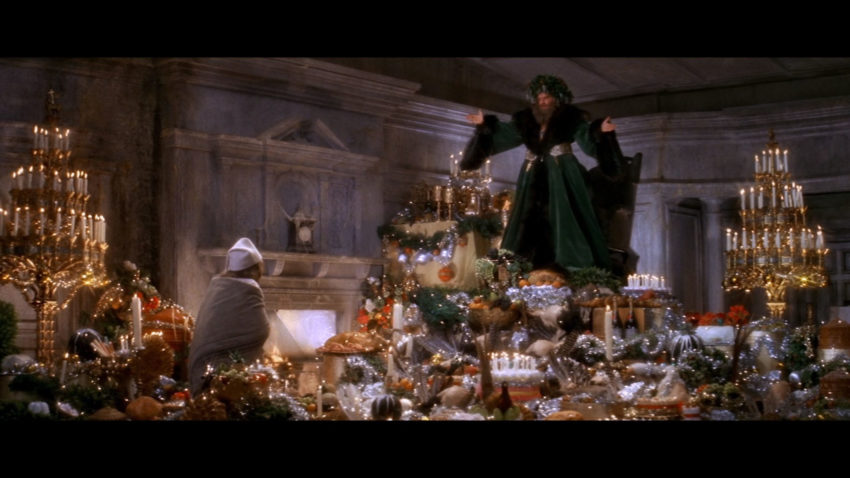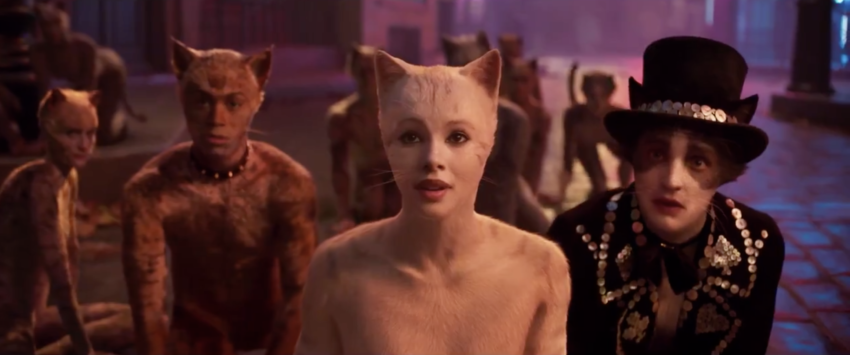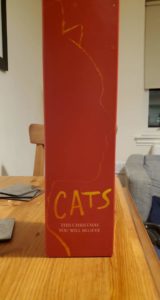EDITOR’S NOTE: In case you didn’t catch the byline, this is the very first guest post published on Delayed Responses! Please enjoy this piece from the biggest Cats enthusiast I know, Gina Elbert.
Move over, Die Hard: there’s a new controversial Christmas movie in town. That’s right, I bring to you: Cats (2019).
Not your first guess? Well, that might be a mistake. Tom Hooper’s seminal film Cats was released on December 20, 2019, on the same day as The Rise of Skywalker, which some might argue was a worse movie.* Opening against the ninth and final Star Wars film was a choice, and announcing a near-immediate re-release on opening day was also a choice. But perhaps the greatest choice of all lay in the marketing of this movie as a Christmas film.
For those uninitiated into the cult of Cats, it’s a live-action film adaptation of the eponymous 1981 Andrew Lloyd Webber musical, which itself is based on a collection of poems by T.S. Eliot. It follows a group of strays called Jellicle cats who compete in front of an ancient, God-like cat named Old Deuteronomy (in the film version, played by Judi Dench) for rebirth via a trip to the Heaviside Layer. The cats include such notable names as Bustopher Jones (James Corden), Jennyanydots (Rebel Wilson), the outcast Grizabella (Jennifer Hudson), and the highlight of my life, Skimbleshanks (Steven McRae). Each one sings a song about themselves to prove their worth – though in the stage musical, it’s usually another cat singing about them – while the villainous Macavity (Idris Elba) lurks in the background and tries to give the show any further inkling of plot.** To be transparent, it’s not a film that mentions Christmas even once. So why are we here at all?
The trailers for the film featured the taglines, “This Christmas, many will compete; only one can win,” and “You’re invited to the most joyful event of the holiday season.” They’ve each got very different vibes, neither of which I can say is entirely justified, and they’re both in the same trailer. Discussion of the first tagline in a Discord server with some friends led to a vehement argument on the definition of “compete,” while the second is true, but not in a way that the filmmakers intended. Well, alright, I can only guess as to what Tom Hooper was thinking, but I derived my joy more from the inexplicable absurdity of the film’s execution and my personal cinematic experience than from the conceit itself (other than the songs of Skimbleshanks and Mr. Mistoffelees, which are true bops).
The Cats tie-in champagne, it all of its glory: the box. (Photo courtesy of Gina Elbert)
The Cats tie-in champagne, it all of its glory: the bottle. (Photo courtesy of Gina Elbert)
There is one intriguing tagline, though, that didn’t make it to the trailers. One March night in Scotland, two of my friends walked into Tesco and were thrilled to come across a bottle of Cats-branded champagne from Piper Heidsieck. Yes, the very same Piper Heidsieck parodied as Pi-purr Heidsieck in the background of “Jellicle Songs for Jellicle Cats.” It was a decent bottle of champagne, but its appearance in a grocery store three whole months after the film’s release says quite a lot about the film’s mainstream popularity, or lack thereof. The box bore the words, “This Christmas, you will believe.”
My friend joked it was a threat. I have only questions: believe in what? Why Christmas? Why this very generic holiday film tagline? Is Cats actually supposed to be a Christmas movie?
To answer this question, we must first take a look at Christmas movies generally. I’m no expert, but I’ve seen my fair share, from classics like It’s a Wonderful Life to Netflix originals like the Princess Switch and Christmas Prince trilogies. Dolly Parton’s Christmas on the Square was almost the topic of this essay; it continues to perplex me. An inexhaustive list of common tropes in movies like these would contain: a romantic storyline, manifestations of magic, at least one musical scene or montage, themes of all kinds of love and family, and someone refusing to believe in the power of Christmas just to be proven wrong. Santa is pretty important, but at the very least we expect a wise, magical elderly person to point the way to good choices. Christian (but not necessarily exclusively so) morality is a strong throughline and a falling-down-the-chimney gag would not go amiss.
Let’s break these down one by one. Most of the film is sung, so the musical element is a no-brainer. The cats do flirt and nuzzle quite a lot, though there is never any kissing despite some moments where you really think it’s going to happen. Hooper even heterosex-ified Mister Mistofelees, a character often considered gay by Cats musical fans, so that he could pair with Victoria, the white cat who is new to the community and who operates as an audience stand-in. There is a certain romance to Victoria discovering and falling in love with the community of Jellicle Cats, which she sings about in “Beautiful Ghosts.”
The Jellicle Cats are a family, and family is key to Christmas movies. This particular group has all of the wacky uncles, troublemaking cousins, and boomer grandparents you could want. At its head is Old Deuteronomy, who acts as a spiritual father (in the original musical, Old Deuteronomy is male) and therefore wise elder to the rest of the cats. The family defines itself in its exclusion of Macavity, his crony Bombalurina, and Grizabella. Grizabella’s story in particular is interesting because of her deep remorse for having once helped Macavity and her eventual redemption and re-acceptance into the family thanks to Victoria’s encouragement. The Jellicle Cats learn compassion because of her and compassion is a key Chirstian moral.
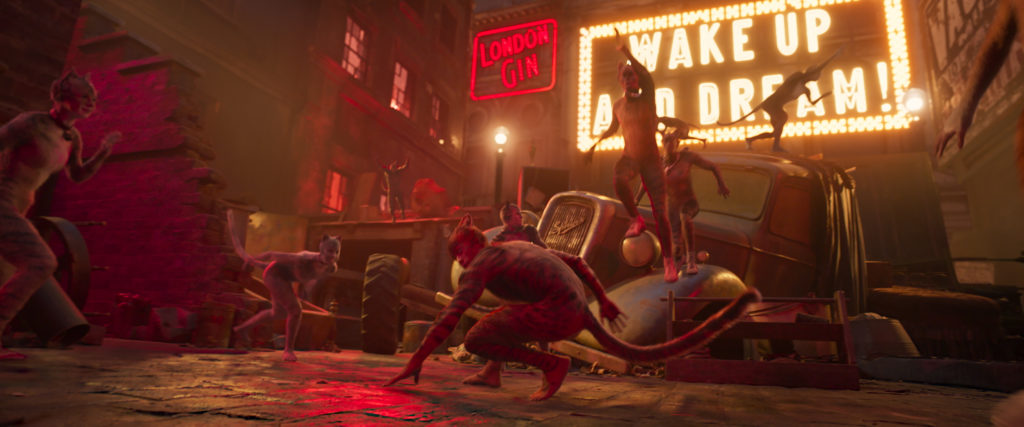
Finally, the movie involves magic, not just in its conceit but also in Macavity’s use of it for disappearing his competitors. It’s the sort of powdery, sparkly cloud that appears in many a holiday movie. Macavity could even be our Scrooge/Grinch-like character, if you squint hard enough. The mystical London of this universe, with its nebulous time period, bafflingly cat-themed but human-sized businesses, and abandoned buildings built on prime real estate echoes the perfect little Christmas villages of Hallmark movies in its festive implausibility.
The biggest giveaway for a Christmas movie is that it actually mentions Christmas, which I will admit Cats doesn’t do. But it does involve questions of faith and spiritual ascendance in its fashioning of the story around the trip to the Heaviside Layer, a real layer in the atmosphere that I generally assume to be a stand-in for Heaven (but who can tell, with T.S. Eliot?). No, Heaven doesn’t generally involve rebirth as far as I know, but it’s still an interesting element. We have only to look at the Star Wars Holiday Special to see that popular media invents secular, Christmas-inspired holidays all the time. The ball and subsequent ascension in Cats definitely comes under the heading of holiday for their participants. Just because there is no clear name for the day doesn’t mean it doesn’t exist.
Cats joins the ranks of many past holiday movies that aren’t strictly about the holidays. Mary Poppins is often played on TV in the UK during the holiday season, but it’s not a Christmas movie either. The library where I work lists The Sound of Music as a film perfect for the season, too. Actually, a lot of movie musicals are released during the Christmas season. They’re not explicitly festive, but they are marketed similarly to the way in which Cats was. I imagine this is because families need something to do while the kids are on vacation, so why not take them to an all-ages movie that everyone can enjoy? This works with some musical films released during the Christmas season, like Mary Poppins Returns and Into the Woods; less so with titles like Les Misérables (also a Tom Hooper production!), West Side Story, and of course Cats.
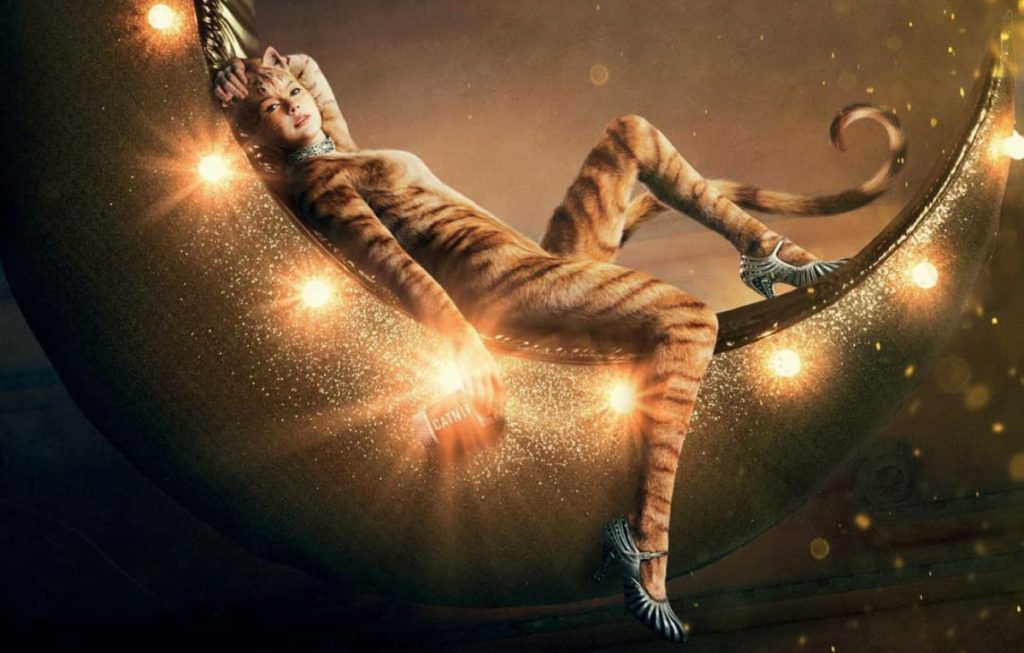
Cats is a very sensual, often confusing movie. A kid might miss a lot of the innuendo, sure, but it’s not overall something that anyone would immediately peg as a family film even without that. Almost every professional review of the movie found it erotic, perhaps disturbingly so, and it’s hard to deny that Old Deuteronomy spreading her legs for Gus the Theater Cat in delight over his performance or the cats’ tails going suddenly rigid while dancing at the ball sets off horny alarm bells.*** The IMDb parents’ guide for the film lists “moderate” sex (though the real meat of that page is where “James Corden” is listed under “Frightening & Intense Scenes”). Speaking of James Corden: he appears in many children’s films, which often have star-studded casts, but there’s little in this movie that actually calls to kids. The colors are fairly muted, all of the characters are adults (besides Jennyanydot’s mice), there isn’t much action outside the dancing and the one fight scene on the barge, and there isn’t a clear plot arc to follow. Kids are often into very surprising things, but that doesn’t necessarily mean that the movie’s marketing made sense either.
Cats was released exactly two years ago to this day, just before Christmas, and in combination with its vaguely Christmas-like story and its marketing, I do question how much of its Christmassy-nature was manufactured paratextually. I probably wouldn’t be asking these questions at all if the movie came out in, say, October. However, the two times I saw the film in theaters – on opening night, then about a week after the re-release – were some of the best times I’ve ever spent at a cinema. The pure shock of the cat in the sky in the opening shot, the exhilaration of “Skimbleshanks,” the communal joy of singing along to “Mister Mistoffelees,” and the horror of Judy Dench breaking the fourth wall in “The Ad-dressing of Cats” were such wonderful, unadulterated emotions. I attended both showings with friends as enthusiastic as I was in the tiny, mostly-empty theater in my hometown that has sadly closed down permanently due to the pandemic.**** I can only imagine the other movie-goers, like the mom and her son who asked if we minded if they ate Chinese food behind us, were bewildered by how much fun we had. To me, that’s what a Christmas movie is all about – the kind of love and longing that it can stir up inside of you. Those are feelings worth celebrating, especially now. I could what-if myself into oblivion about the filmmakers’ choices, but I will never escape the fact that, in this timeline, Cats is a Christmas movie.
GINA ELBERT is a writer and children’s librarian in Westchester County, NY. A friend of Leah’s from Pratt, Gina loves to do crosswords, journal, and fawn over cats (the animals and the film) in her free time.
*My friend and I saw Cats on the night of the 19th in an early showing and saw Rise of Skywalker the next afternoon. We’re both fans of Star Wars, yet had infinitely more fun at Cats. That’s a discussion for another day.
**Okay, that’s a bit harsh – you don’t always need plot to tell a good story! And I would argue that the stage show version of Cats works without one. The movie occupies a liminal space between plot and no plot because of its attempt at creating a mainstream narrative structure, which makes things… interesting.
***That said, the dancing in the film is very good from a technical standpoint, at least to my eyes.
****Since publishing, there’s been some good news! The theater looks like it will be revived after all.
